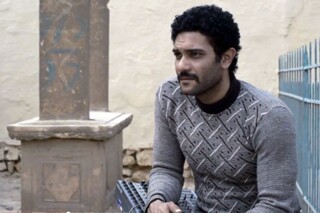At the Movies
Ursula Lindsey
Jehane Noujaim’s Oscar-nominated documentary The Square still hasn’t been screened in Cairo. It was scheduled to play at a local film festival but pulled at the last minute; the Censor’s Office has still not approved the movie’s general release. It’s not hard to see why. The scenes of revolutionary fervour and army and police brutality are at odds with the prevailing version of events here, in which generals are saviours and all protesters suspects.
The first hour of Noujaim’s film is full of familiar faces and jolting violence. The courage of the film-makers, who time and again barely dodged police onslaughts, results in some extraordinary footage. It is hard to watch this reminder of the yearning and suffering that followed Mubarak’s ouster. But it's important to have this record. I imagined it being played on a continuous loop on all of Egypt’s TV channels, instead of the screeds against ‘terrorism’ and pop music video clips featuring military deployments.
Noujaim tells her story by following three people who became friends in Tahrir. Magdy Ashour is a member of the Muslim Brotherhood who doesn’t always follow the leadership’s orders; Khalid Abdalla is an actor and activist from a family of dissidents; and Ahmed Hassan is a young man from a poor background who embraces the uprising like a birthright. ‘We’re not looking for a leader,’ he says, ‘as much as we’re looking for a conscience.’
The three men come to realise that their revolution is slipping between their fingers. We see army officers blithely dismissing the kids in the square, and then the killings begin. Bleeding protesters are treated in field hospitals. The mother of a young Christian killed by the army leans against a wall, saying: ‘I’m not upset for the martyr in you, my love. But losing you hurts me.’
The political opportunism and ascendancy of the Muslim Brotherhood strains the men’s friendship. Magdy in the end chooses ‘the side I grew up with’ and joins the Rabaa al-Adawiya sit-in calling for President Morsi’s reinstatement. But by this point the film – which was updated four times – has lost focus, as it struggles to keep up with events and clings to a vaguely uplifting conclusion. It aligns itself so closely with the point of view of would-be revolutionaries that it succumbs to the confusion, the understandable exhaustion and the fog of wilful optimism that descended on many of them last summer. It closes with a concert in Tahrir rather than the massacre in a different square across town.
But how do you make a movie about a story that never ends, and that keeps getting darker? Ahmed Abdalla takes a different tack from Noujaim: Rags and Tatters is bleak from the beginning. It showed in Egyptian cinemas for only two weeks and was almost unanimously loathed by critics, who disliked the way Abdalla refuses to take sides or make pronouncements (the film has almost no dialogue) and silently rebukes both official propaganda and sentimental views of the revolution.
The film is set during the uprising but the protagonist, played by Asser Yassin, never spends time in Tahrir. A convict who gets out when the authorities open the prisons to foment chaos, he wanders through poor neighbourhoods on the outskirts of town. Abdalla does something radical simply by focusing closely on these environments of extreme and enduring deprivation, on crumbling staircases and bare rooms, broken windows and peeling paint. A man’s whole life here fits in a duffle bag: a few old ID cards, some tools, a windbreaker.
Abdalla, who has been deeply involved in the protests of the last three years, told me he remembers worrying, in Tahrir, that ‘this is something that is just holding together, but is going to collapse; we all don't want Mubarak but we don't want to work together, to be part of each other's lives.’
